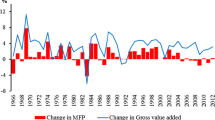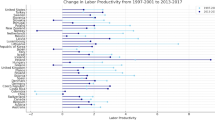Abstract
Economic sector of information and communication technologies (ICTs) is one of the most innovative and has several positive consequences on productivity and economic growth. Our main aim was to identify potential determinants affecting the employment in ICT in short-run and long-run. We also examine its structure according to subsectors, gender, age and education in EU countries. We find significant differences between countries in the structure of ICT employment and also indentify several trends. Based on the results there is in general a decreasing trend of women employed as ICT specialists in the EU. Significant drop was recorded especially during economic crisis in 2009–2010. On the other hand the share of ICT specialist with higher education is growing in recent years. Furthermore, we applied correlation, panel Granger causality tests and panel cointegration regression in order to find potential determinants of employment ICT. Our results suggest that there is a positive effect of ICT skills and education on employment in ICT. This is especially true in the case of employment in ICT services. Furthermore, economic situation as well as share of people using internet in the country seems to be both significant determinants of employment in ICT in the long-run.
Access this chapter
Tax calculation will be finalised at checkout
Purchases are for personal use only
Similar content being viewed by others
References
Bauer JM, Shim W (2012) Regulation and innovation in telecommunications. Quello Center Working Paper 01-2012. Presented at scientific seminar entitled communications & media markets: emerging trends & policy issues, pp 1–26
Pohjola M (2003) The adoption and diffusion of ICT across countries: patterns and determinants. The new economy handbook, pp 77–100
Doucek P (2010) Human resources in ICT–ICT effects on GDP. In: IDIMT-2010: information technology–human values, innovation and economy, pp 97–105
Stiroh KJ (2002) Information technology and the US productivity revival: what do the industry data say? Am Econ Rev 92(5):1559–1576
Cardona M, Kretschmer T, Strobel T (2013) ICT and productivity: conclusions from the empirical literature. Inf Econ Policy 25(3):109–125
Hall BH, Lotti F, Mairesse J (2013) Evidence on the impact of R&D and ICT investments on innovation and productivity in Italian firms. Econ Innov New Technol 22(3):300–328
Brynjolfsson E, Saunders A (2010) Wired for innovation. How information technology is reshaping the economy, Cambridge, Massachusetts-London
Brynjolfsson E (2011) Innovation and the E-economy. Unpublished paper. MIT, Sloan School of Management
Lall S (1996) Learning from the Asian Tigers: studies in technology and industrial policy. Springer
Ngwenyama O, Morawczynski O (2009) Factors affecting ICT expansion in emerging economies: an analysis of ICT infrastructure expansion in five Latin American countries. Inf Technol Dev 15(4):237–258
Rai D, Kurnia S (2017) Factors affecting the growth of the ICT industry: the case of Bhutan. In: International conference on social implications of computers in developing countries. Springer, Cham, pp 728–739
Pisar P, Hunady J, Balco P (2018) Employment in information and communication technologies in European countries and its potential determinants and consequences. In: Xhafa F, Barolli L, Greguš M (eds) Advances in intelligent networking and collaborative systems. INCoS 2018. Lecture notes on data engineering and communications technologies, vol 23. Springer, Cham
Kaczor S, Kryvinska N (2013) It is all about services—fundamentals, drivers, and business models. Soc Serv Sci J Serv Sci Res Springer 5(2):125–154
Pedroni P (2004) Panel cointegration: asymptotic and finite sample properties of pooled time series tests with an application to the PPP hypothesis. Econ Theory 20(3):597–625
Phillips PCB, Moon HR (1999) Linear regression limit theory for nonstationary panel data. Econometrica 67:67-1057-111
Kao C (1999) Spurious regression and residual based tests for cointegration in panel data. J Econ 90(1):1–44
Pedroni P (2001) Purchasing power parity tests in cointegrated panels. Rev Econ Stat 83:727–731
Gregus M, Kryvinska N (2015) Service orientation of enterprises—aspects, dimensions, technologies. Comenius University in Bratislava. ISBN: 9788022339780
Kryvinska N (2012) Building consistent formal specification for the service enterprise agility foundation. Soc Serv Sci J Serv Sci Res Springer 4(2):235–269
Kryvinska N, Gregus M (2014) SOA and its business value in requirements, features, practices and methodologies. Comenius University in Bratislava. ISBN: 9788022337649
Acknowledgements
This work has been supported by the Scientific Grant Agency of Slovak Republic under project VEGA No. 1/1009/16 “Innovation potential of the regions of Slovakia, its measurement and innovation policy at the regional level”.
Author information
Authors and Affiliations
Corresponding author
Editor information
Editors and Affiliations
Rights and permissions
Copyright information
© 2020 Springer Nature Switzerland AG
About this chapter
Cite this chapter
Huňady, J., Pisár, P., Balco, P. (2020). Determinants of Employment in Information and Communication Technologies and Its Structure. In: Kryvinska, N., Greguš, M. (eds) Data-Centric Business and Applications. Lecture Notes on Data Engineering and Communications Technologies, vol 30. Springer, Cham. https://doi.org/10.1007/978-3-030-19069-9_11
Download citation
DOI: https://doi.org/10.1007/978-3-030-19069-9_11
Published:
Publisher Name: Springer, Cham
Print ISBN: 978-3-030-19068-2
Online ISBN: 978-3-030-19069-9
eBook Packages: Intelligent Technologies and RoboticsIntelligent Technologies and Robotics (R0)




